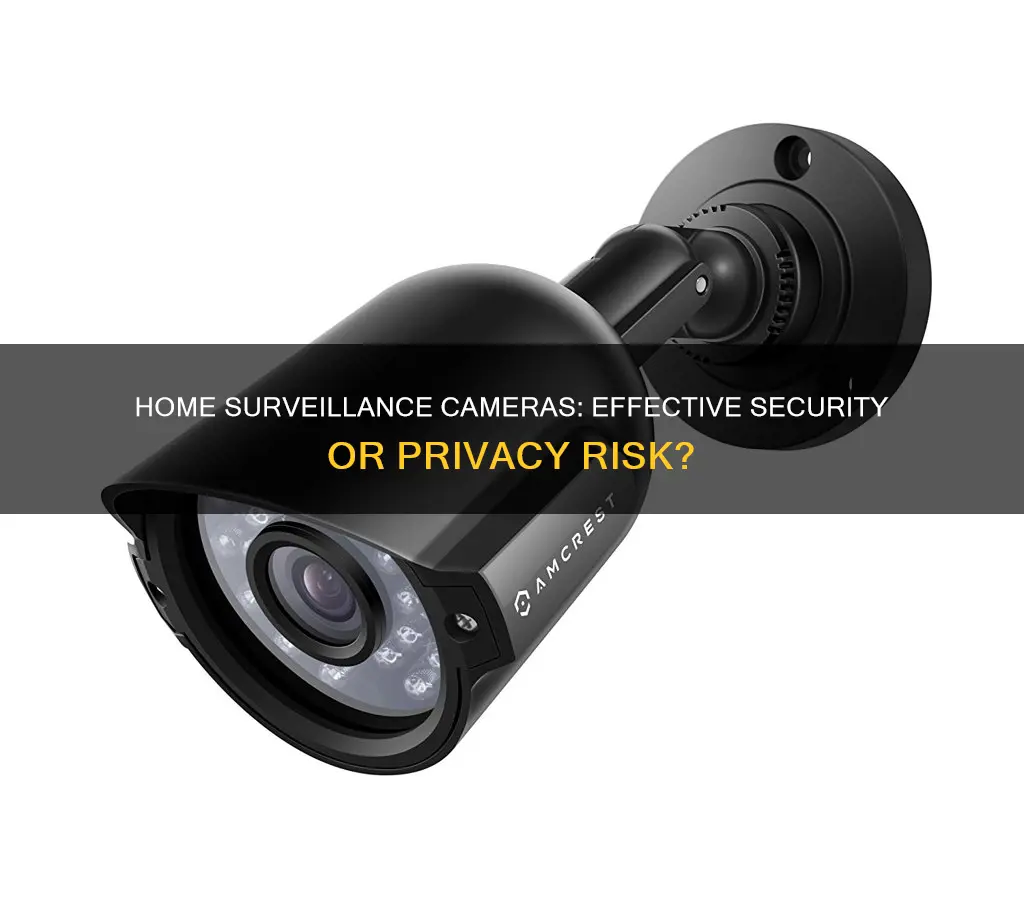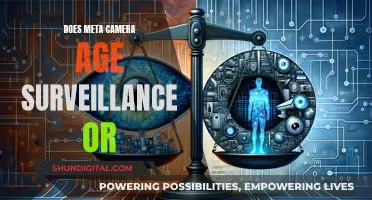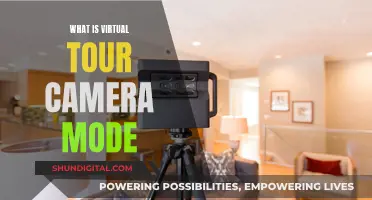
Home surveillance cameras are an effective tool for monitoring your home and can provide peace of mind when you're away. They can serve as a deterrent to potential intruders and aid in police investigations if a crime occurs. However, they should be used in conjunction with other security measures as they cannot guarantee the security of your property on their own.
The effectiveness of home surveillance cameras depends on various factors, including camera placement, resolution, field of view, power source, storage options, and smart home integration. It's important to consider your specific needs and budget when choosing a camera system. Additionally, privacy concerns and the potential for hacking are important considerations.
| Characteristics | Values |
|---|---|
| Cost | $40 - upwards of $200 |
| Video Quality | 1080p - 4K |
| Field of View | 110° - 180° |
| Power Source | Wired or Wireless |
| Storage | Cloud or Local |
| Smart Home Integration | Amazon Alexa, Google Assistant, Apple HomeKit, Samsung SmartThings, IFTTT |
What You'll Learn

Home surveillance cameras can deter crime
Home surveillance cameras are an effective way to deter crime and improve home security. They provide an extra set of eyes, allowing remote monitoring of your property and can be a powerful visual deterrent to potential intruders. Here are some reasons why home surveillance cameras can be an effective crime deterrent:
Visible Deterrent
The presence of security cameras can make your home a less attractive target for criminals. The sight of a camera is often enough to deter potential burglars, as they do not want to be seen or recorded. This is supported by a study by the University of North Carolina at Charlotte's Department of Criminal Justice and Criminology, which found that most burglars considered indicators of increased security, such as outdoor cameras, when selecting a target.
Increased Chances of Apprehension
Surveillance cameras can help identify and apprehend criminals in the event of a crime. The footage captured by these cameras can be provided to law enforcement, increasing the chances of catching and prosecuting offenders. This not only helps bring criminals to justice but also acts as a deterrent for future crimes.
Integration with Other Security Measures
Home surveillance cameras can be integrated with other security measures to create a comprehensive home security system. This includes motion sensors, alarms, and smart home automation. By combining multiple security elements, you can enhance the effectiveness of the cameras in deterring and preventing crimes.
Remote Monitoring and Notifications
Modern home surveillance cameras often come with remote monitoring capabilities, allowing you to check in on your property from anywhere via a mobile app. This provides peace of mind and helps you stay vigilant even when you're not physically present. Many cameras also offer motion detection and notification features, alerting you to any suspicious activity in real time.
Evidence for Insurance Claims
In the unfortunate event of a break-in or property damage, footage from home surveillance cameras can be invaluable for insurance claims. Providing recorded surveillance video can help expedite the claims process and provide crucial evidence to support your case. Some insurance companies may even offer discounts to homeowners who have installed security cameras.
Monitor More Than Just Intruders
Home surveillance cameras can do more than just deter crime. They can also be used to keep an eye on children, pets, and valuable possessions. With features like facial recognition and two-way audio, you can stay connected and ensure the safety of your loved ones, even when you're not physically present.
While home surveillance cameras can be an effective crime deterrent, it's important to note that they are just one part of a comprehensive home security strategy. For maximum protection, consider combining them with other security measures such as alarms, motion sensors, and proper lighting. Additionally, always research the privacy laws and regulations in your area to ensure your surveillance system complies with legal requirements.
Surveillance Cameras: Privacy Intrusion or Security Essential?
You may want to see also

They can provide evidence to the police
Home surveillance cameras can be an effective tool for providing evidence to the police. In the event of a crime, footage from security cameras can be used to help identify suspects and gather evidence. This can be especially useful in cases where eyewitness testimony may be unreliable.
In some cases, police may be able to access security camera footage directly, but this is usually limited to footage from public spaces or with the owner's consent. In most cases, police will need to obtain a warrant or court order to access footage from private residences or businesses. Even if a crime has not been committed, police may still request to review camera footage if a suspicious incident or complaint has been reported in the area.
It is important to note that there may be legal and privacy implications when sharing security camera footage with the police. For example, in the United States, the Fourth Amendment protects against unreasonable searches and seizures without a warrant. Additionally, some states have two-party consent laws that require the consent of all parties involved for the recording of audio conversations.
If you are considering sharing security camera footage with the police, it is recommended to confirm the legitimacy of the request, seek legal advice if necessary, and only provide specific time frames and clips relevant to the investigation.
Cop Camera Battery Life: How Long Does It Last?
You may want to see also

They can be used to monitor pets and children
Home surveillance cameras can be used to monitor pets and children. Here are some ways in which home surveillance cameras can be used to monitor children:
- Seeing Them Home from School: Home security cameras can help parents ensure their children get home safely from school. With home security, parents can receive alerts and see that their children have arrived home.
- Checking in on Them When They Are Home Alone: Home surveillance cameras allow parents to check in on their children remotely via a live video feed on their smartphone or tablet. This can provide peace of mind while allowing children to exercise independence and stay home alone.
- Making Sure Chores are Done: With live video feed, parents can verify if their children have completed their chores before granting permission to go out or play with friends.
- Solving Disputes and Arguments: Recorded video footage from security cameras can help definitively solve disputes or arguments by providing evidence of what actually happened.
- Monitoring Backyard Play: Surveillance cameras can be used to monitor children's outdoor play and intervene if things start to get out of hand.
- Ensuring a Good Night's Sleep: Video surveillance can help parents ensure their children are getting a good night's sleep by keeping an eye on their phone usage and social media activity.
- Monitoring Pet Behaviour: Pet cameras allow owners to keep an eye on their pets' behaviour and activities while they are away. This can help solve mysteries, such as why there is fur on the kitchen counter or a destroyed pillow.
- Reducing Separation Anxiety: Home surveillance cameras can help calm any nervousness or guilt felt by pet owners when leaving their pets home alone.
- Notifying Pet Movement: Some cameras can distinguish between people and pets, sending alerts when pets move around, so owners can always be informed about their pets' activities.
- Interacting with Pets: Two-way audio on indoor cameras allows owners to hear and talk to their pets remotely, providing a way to interact and communicate with them even when not physically present.
Charging Drift HD Camera Batteries: A Step-by-Step Guide
You may want to see also

They can be costly
Home security cameras can be costly, with prices ranging from tens to hundreds of dollars per camera. The cost of the camera equipment depends on various factors, such as the type of camera, video resolution, field of view, artificial intelligence capabilities, night vision quality, smart platform integration, and power source.
Wireless outdoor cameras tend to be more expensive than wired indoor cameras because they are easier to install and offer greater flexibility in placement. Cameras with higher video resolutions, such as 4K, are generally more expensive than those with lower resolutions, like 720p HD.
In addition to the equipment cost, there may be additional expenses associated with cloud storage subscriptions, professional installation, and maintenance. Some cameras offer free cloud storage, while others require a paid subscription to access advanced features and store footage. Professional installation can cost around $100 to $200 on average, and maintenance costs may arise over time for lower-quality cameras.
When considering the cost of home security cameras, it is important to weigh the benefits against the expenses. Security cameras can provide peace of mind, visual access to your home, and valuable footage in the event of a break-in or package theft. Additionally, studies have shown that security cameras can deter crime and reduce the risk of burglaries.
To save money, it is advisable to compare different camera models and brands, as well as consider DIY installation to avoid professional installation fees. Some companies also offer customised camera systems and packages that can be tailored to your budget.
Logitech Circle Camera: How Long Does the Battery Last?
You may want to see also

They can be hacked
Home surveillance cameras are vulnerable to hacking, and there have been several reports of such incidents. Hackers can gain access to your camera through a process called credential stuffing, where they use login credentials obtained from a data breach to try and log in to your camera's app.
To prevent this from happening, it is important to follow good password practices. This includes using long and complex passwords with a mix of uppercase letters, numbers, and symbols, and not reusing the same password across multiple accounts. It is also crucial to update default factory passwords when you purchase a new camera.
In addition to strong passwords, you can also secure your cameras by setting up two-factor authentication, regularly updating your camera's settings, and installing firewalls and antivirus software on any computers used to access the cameras.
By taking these precautions, you can help protect your home and family from the invasion of privacy and potential risks associated with hacked home surveillance cameras.
Traffic Camera Tickets: Are They Legally Binding?
You may want to see also
Frequently asked questions
Yes, home surveillance cameras can deter burglars. A study by the University of North Carolina at Charlotte’s Department of Criminal Justice and Criminology showed that most burglars considered indicators of increased security, such as outdoor cameras, when selecting a target. Approximately 60% of burglars said they would find a different target if an alarm were present.
Home surveillance cameras can provide video evidence for insurance or police claims. They can also be used to monitor pets and babies.
Home surveillance cameras can be costly and may reduce your sense of privacy. They can also be the target of theft themselves.
Some good home surveillance cameras include the Arlo Pro 5S 2K Spotlight Camera, the Reolink Duo 3 PoE, the Google Nest Indoor/Outdoor Cam (2nd-gen), the Ring Indoor/Outdoor Stick Up Cam Pro, and the Eufy 4G "Starlight" Camera S230.
When buying a home surveillance camera, consider the camera's resolution, field of view, power source, storage options, and Wi-Fi connection.







